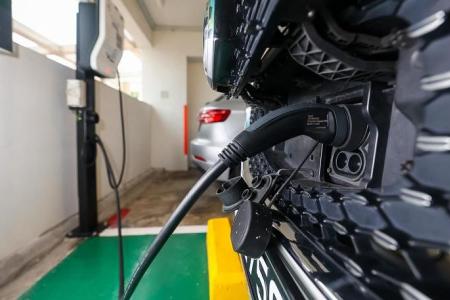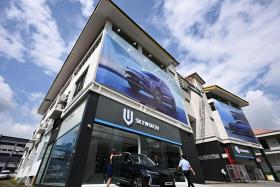EV chargers now available at about half of all HDB carparks
Users of electric vehicles (EV) now have access to charging points at about 1,000 or half of the Housing Board carparks islandwide, the Land Transport Authority (LTA) said on Aug 5.
This is up from January’s figure of about 700 HDB carparks. At that time, there were more than 2,400 charging points at these carparks.
LTA added that its subsidiary, EV-Electric (EVe) Charging, is on track to deploy charging points at all HDB carparks by the end of 2025. The Government’s aim is to install at least 12,000 EV chargers in about 2,000 HDB carparks by that time.
Some of the newer EV chargers at HDB carparks are at Blocks 259/264 Jurong East Street 24, Blocks 135/138 Bishan Street 12, and Blocks 134/136 Bedok North Avenue 3, according to the EVe website.
In total, there are now around 13,800 registered EV charging points across Singapore, LTA said. Of these, 6,700 are publicly accessible ones, while 7,100 are private EV chargers.
In the first six months of 2024, almost one in three new cars registered in Singapore was an EV.
The latest available figures from LTA show that of the 18,576 new cars registered between January and June, 6,019 units – or about 32.4 per cent – were EVs.
This is up from around 18.1 per cent for the whole of 2023, and 11.7 per cent for 2022.
At present, about 18,000 cars – or 2.7 per cent of Singapore’s total car population – are electric, said LTA.
Speaking to the media at an EV charger demonstration on Aug 5 at The Quintet condominium in Choa Chu Kang, Dr Amy Khor, Senior Minister of State for Transport, and Sustainability and the Environment, said LTA’s EV Common Charger Grant has had a good take-up rate.
More than 1,200 co-funded chargers have been installed in condos so far.
Capped at $4,000 for each charger, the grant foots up to half the bill for every charger installed. Intended to accelerate the roll-out of chargers, the grant is available for the installation of chargers at up to 1 per cent of residential parking spots at each condo.
The grant is available until December 2025, or when 2,000 co-funded chargers are installed, whichever comes first.
Dr Khor estimates that by the end of 2024, about one in five condos here will have EV charging points.
On the challenges of rolling out EV charging infrastructure, Dr Khor said recent changes to the Building Maintenance and Strata Management Act are likely to increase the uptake of the chargers.
The changes include lowering the voting threshold needed to pass a resolution to install EV chargers at condos to 50 per cent of residents, down from 90 per cent.
Mr Ang Chee Siong, chairman of The Quintet’s management council, said there had been some concerns among residents about using the condo’s resources to support EV charging infrastructure that would be used only by 1 or 2 per cent of its residents.
The condo’s management council worked out a “zero-cost” installation plan with the EV charging contractor, in which the contractor would recover the set-up costs through the EV Common Charger Grant and charging fees earned from residents. This resulted in 90 per cent of the condo’s residents agreeing to install six chargers.
LTA on Aug 5 said it will waive registration fees for EV chargers used solely for educational as well as research and development purposes, such as the training of equipment specialists. These activities take place at educational and research institutes, such as institutes of higher learning.
The authority said the waiver is set to take effect by the fourth quarter of 2024, and will “facilitate innovation and skills upgrading for the sector”.
This comes after Transport Minister Chee Hong Tat announced in July a waiver of registration fees for EV chargers used for short-term purposes of up to two months, such as for exhibitions or trade shows.
Asked by the media about the hogging of EV chargers, Dr Khor said engagement and feedback sessions on charging etiquette have been carried out, and some guidelines will be released soon.
“With regard to hogging, I think it’s still not common, simply because... there are only about 18,000 EVs in Singapore... so I think that there are actually adequate EV charging points available as of now,” she added.
Get The New Paper on your phone with the free TNP app. Download from the Apple App Store or Google Play Store now


